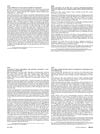 10 citations,
September 2021 in “JAMA Dermatology”
10 citations,
September 2021 in “JAMA Dermatology” Different types of persistent hair loss after chemotherapy respond differently to treatments.
[object Object]  January 2025 in “Journal of Education Health and Sport”
January 2025 in “Journal of Education Health and Sport” More effective methods are needed to prevent hair loss from chemotherapy.
 70 citations,
February 2015 in “Expert Opinion on Drug Discovery”
70 citations,
February 2015 in “Expert Opinion on Drug Discovery” Topical drugs and near-infrared light therapy show potential for treating alopecia.
 4 citations,
April 2001 in “European journal of cancer”
4 citations,
April 2001 in “European journal of cancer” Scalp cooling prevented hair loss in half of the patients, despite significant side effects.
 January 2018 in “Elsevier eBooks”
January 2018 in “Elsevier eBooks” The document concludes that alopecia has significant social and psychological effects, leading to a market for hair loss treatments.
 21 citations,
August 2016 in “Translational Andrology and Urology”
21 citations,
August 2016 in “Translational Andrology and Urology” Delayed ejaculation is a complex issue caused by psychological, biological, and lifestyle factors, requiring a holistic treatment approach.
24 citations,
August 2020 in “JAMA dermatology” Persistent radiation-induced hair loss is dose-dependent, and treatments like topical minoxidil can be effective.
55 citations,
May 2007 in “Australasian journal of dermatology” Two boys developed a viral skin infection during chemotherapy, which resolved with improved immune function.
 June 2024 in “British Journal of Dermatology”
June 2024 in “British Journal of Dermatology” Permanent hair loss from chemotherapy significantly impacts patients' mental health and social life, highlighting the need for better patient education and support.
45 citations,
July 2006 in “Journal of Investigative Dermatology” Chemotherapy affects blood vessels in hair follicles, not stem cells, allowing hair regrowth.
 3 citations,
April 2019 in “Clinical Therapeutics”
3 citations,
April 2019 in “Clinical Therapeutics” Computational tools identified 29 drugs that could potentially target 19 genes involved in chemotherapy-induced hair loss, which could lead to more effective treatments.
 48 citations,
February 2017 in “Journal of Cosmetic Dermatology”
48 citations,
February 2017 in “Journal of Cosmetic Dermatology” The conclusion is to use scalp cooling, gentle hair care, and treatments like minoxidil for managing hair loss from chemotherapy, and stresses the need for more research and collaboration in this area.
[object Object] 32 citations,
September 2013 in “Breast cancer research” A specific gene variant is linked to a higher risk of hair loss from chemotherapy in breast cancer patients.
 1 citations,
May 2023 in “Jurnal Kedokteran Diponegoro”
1 citations,
May 2023 in “Jurnal Kedokteran Diponegoro” Chemotherapy for prostate, bladder, and testicular cancer patients commonly causes hair loss, fatigue, and decreased appetite.
 18 citations,
December 1996 in “Seminars in Cutaneous Medicine and Surgery”
18 citations,
December 1996 in “Seminars in Cutaneous Medicine and Surgery” Chemotherapy and cytokine therapy can cause various skin reactions, including hair loss and hypersensitivity.
 December 2017 in “Revista da Sociedade Portuguesa de Dermatologia e Venereologia”
December 2017 in “Revista da Sociedade Portuguesa de Dermatologia e Venereologia” Topical minoxidil may help regrow hair after permanent hair loss from chemotherapy.
 23 citations,
December 2015 in “Anais Brasileiros de Dermatologia”
23 citations,
December 2015 in “Anais Brasileiros de Dermatologia” Permanent hair loss after bone marrow transplant can be caused by chemotherapy or chronic graft-versus-host disease.
 August 2018 in “Journal of the American Academy of Dermatology”
August 2018 in “Journal of the American Academy of Dermatology” Patients often experience long-lasting changes to their hair after stem cell transplants.
 April 2016 in “Journal of The American Academy of Dermatology”
April 2016 in “Journal of The American Academy of Dermatology” A child on life support experienced rapid hair loss due to severe illness affecting hair growth.
 159 citations,
September 2001 in “European Journal of Cancer Care”
159 citations,
September 2001 in “European Journal of Cancer Care” Chemotherapy-induced hair loss significantly affects patients' well-being, and nurses are key in helping them cope, but more research is needed to find effective treatments.
 15 citations,
January 2015 in “Skin Pharmacology and Physiology”
15 citations,
January 2015 in “Skin Pharmacology and Physiology” Parathyroid hormones are important for hair growth, but their use in treating hair loss from chemotherapy is still uncertain.
 8 citations,
April 2011 in “Surgery today”
8 citations,
April 2011 in “Surgery today” A substance called sodium zinc dihydrolipoylhistidinate can significantly reduce hair loss caused by chemotherapy in rats.
 10 citations,
January 2019 in “Biomarker Insights”
10 citations,
January 2019 in “Biomarker Insights” Scalp cooling to prevent hair loss from chemotherapy works for some but not all, and studying hair damage markers could improve prevention and treatment.
 150 citations,
March 1995 in “Annals of Oncology”
150 citations,
March 1995 in “Annals of Oncology” Palliative chemotherapy is cost-effective for advanced gastric and colorectal cancer but not clearly for pancreatic-biliary cancer.
 7 citations,
September 2006 in “Clinical lymphoma & myeloma”
7 citations,
September 2006 in “Clinical lymphoma & myeloma” Balancing treatment effectiveness with side effects is crucial for relapsed follicular non-Hodgkin's lymphoma, especially in older patients.
 August 2022 in “Deleted Journal”
August 2022 in “Deleted Journal” Nutritional education reduces chemotherapy side effects and improves health in breast cancer patients.
21 citations,
September 2015 in “International journal of gynaecology and obstetrics” Chemotherapy is crucial for treating gynecological cancers but requires careful management due to severe side effects.
71 citations,
January 2011 in “Journal of cutaneous pathology” A rare skin condition was confirmed to be associated with a specific virus in a young girl.
 21 citations,
October 2018 in “European Journal of Pharmacology”
21 citations,
October 2018 in “European Journal of Pharmacology” Chemotherapy can cause brain inflammation and damage, and understanding this process could help manage side effects.
99 citations,
September 2007 in “The American journal of pathology” Chemotherapy damages hair follicles, causing hair loss and other cellular changes.























